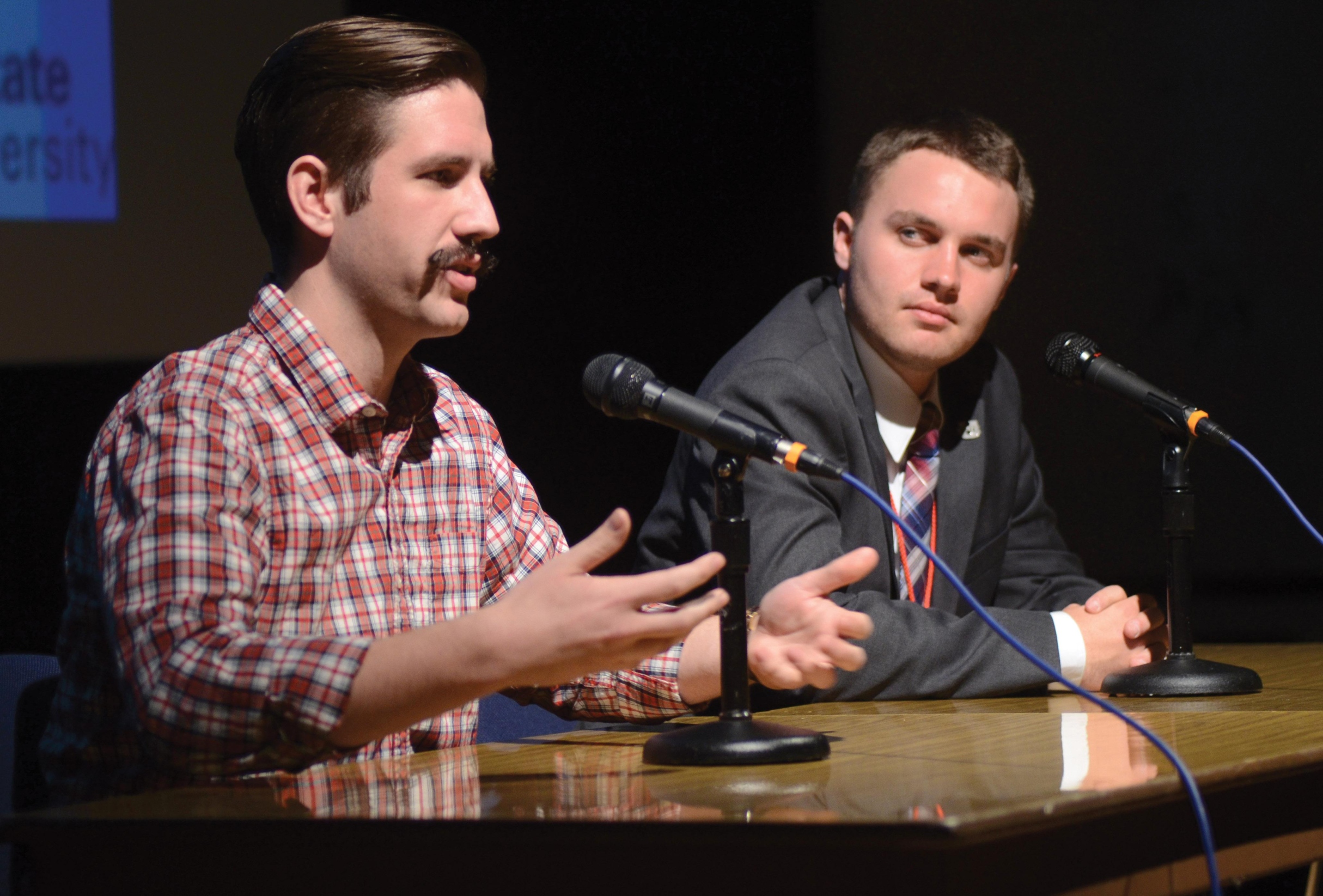Election: And then there were two
Increasing student involvement and executive transparency were themes of the night as the final candidates for USU/SA executive offices debated Tuesday night. The topic was fitting, considering the half-empty TSC Auditorium included a majority of candidates and those volunteering on their campaigns.
Nadir Tekarli, a student involved with several campaigns, said the candidates were successful in their responses, but the lack of students in the audience was disappointing.
“Ideally we would do this in the Spectrum, to be honest, to have that many people there,” he said.
Debate moderators asked candidates how they would use their elected position to further student involvement on campus.
Presidential candidate and incumbent Doug Fiefia cited the myVoice platform that was implemented this year, a promise he said he made to students during his presidency. He said more than 1,200 concerns have been submitted to date, and he plans to continue streamlined student access to government if re-elected.
Fiefia also emphasized the importance of being visible and available to students.
“I think the biggest thing we’ve worked on this year is making sure that we’re down in the info booth and talking to students, that we’re being aware,” Fiefia said. “I think that’s very different from office hours, waiting for students to come to you and then going out and saying, ‘Hey, do you have any questions? These are the issues. This is what we’re working on.'”
Ryan Lambert, a presidential candidate, said the student body needs to be more aware of the decisions being made that affect them. If elected, he plans to have the Executive Council work more closely with the Academic Senate to make that happen.
“The Executive Council can’t display everything. They need to get out into the colleges,” Lambert said. “I think the way to do that is by strengthening that gap between the Exec Council and the Academic Senate so that they are the ones reaching students who aren’t in the TSC all the time.”
Promotional weeks for colleges and colleges’ use of student funding were also debated topics. Most candidates agreed college weeks are beneficial and should be utilized by the colleges.
Spencer Steadman, a candidate for Executive vice president, said college weeks should be utilized as a recruitment tool to attract high-ability students because the university needs the talent.
“Anything that we can do to increase people’s pride in their college is really important, and if we have cool enough events, getting people to the university and to go to the colleges that interest them, that’s really, really important,” Steadman said.
Opposing candidate Matt Ditto said the amount of money being put into college weeks is well worth it, citing that the Engineering and Business colleges, which receive a lot of donor funding, did well with their weeks.
“If you have better weeks, better alumni, it’s bringing unity to your college,” Ditto said. “I think that’s the purpose of it, so the amount of money we’re putting into it for the amount of money we’re getting is well worth it.”
John Wicker, a candidate for College of Education senator, said he doesn’t see college weeks as an effective tool in his college. He said the Collins Touhy lecture was a successful event, but all others were sparsely attended.
“I think that is a massive problem, especially since the bulk of our money went into Collins Touhy,” Wicker said. “I wonder if there could have been more input from the students to get someone even better. I think if we’re going to be spending that much money, we should get the best.”
The pros and cons of fresh faces in executive offices were debated by several candidates. Fiefia said once a president has been elected, it takes about five months to get into the swing of things. If elected, he said he plans to use his continued presidency to affect more changes with his previously established relationships and experience.
Lambert said experience is a non-issue because Fiefia enacted changes in his first year of presidency, a trajectory he would also follow.
“It happens every year,” he said. “Why not do it again next year?”
Ditto shares a similar stance with Fiefia. As the current College of Education senator and a member of the Student Fee Board, Ditto said he knows how the system works and can see the issues that need to be resolved.
“We can have fresh input or we can have change,” Ditto said. “I vote for change.”
Steadman said if the university needed people to understand the technicalities of holding executive office, they would hire someone to educate.
“I think the input that we really need is fresh input,” he said. “If all of the people that are currently on student government get re-elected, that’s over 50 percent of the current voted (executive council) positions. From my point of view, it needs to change.”
Final elections end 3 p.m. Thursday. For more information on candidates and their platforms, pick up a copy of the 2014 Voter Information Packet at a Utah Statesman newsstand or visit vote.usu.edu.
– manda.perkins@gmail.com

